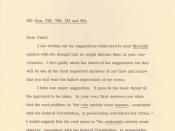Everyone has heard the term "Miranda Rights", whether that be when taking a law class, during the course of a television show, or perhaps through personal experience with their use. What do these two words really mean? Where did they come from and how do they apply to an individual's everyday life? The answers to this question are neither simple nor fully answered today, as challenges to Miranda Rights appear in courtrooms routinely. However, the basis for Miranda Rights can be traced back to a landmark case handed down from the Supreme Court of the United States in 1965 entitled Miranda v. Arizona. Ernesto Miranda was an immigrant from Mexico living in the Phoenix, Arizona area in 1963 when he was accused of kidnapping and raping an 18-year-old woman. The victim picked Miranda out of a lineup and he was subsequently interrogated for two hours during which the police investigators failed to advise him of either his Fifth Amendment Right against self incrimination or his Sixth Amendment Right to request the assistance of an attorney.
Over the course of this interrogation, Ernesto Miranda confessed and signed a written confession of his crimes. Included in his confession was acknowledgement that he had waived his right against self-incrimination. After his conviction based on his confession, Miranda's attorney appealed his sentence on the basis that his confession should be excluded because Miranda had not been informed of his rights by the interrogators. The police officers involved offered the defense that because Miranda had a past conviction, he should have been well aware of his rights. The Arizona Supreme Court denied Miranda's appeal, and his conviction was upheld. Miranda's attorney then appealed the case to the United States Supreme Court in 1965, and the Supreme Court agreed to hear the case. The Miranda v...


